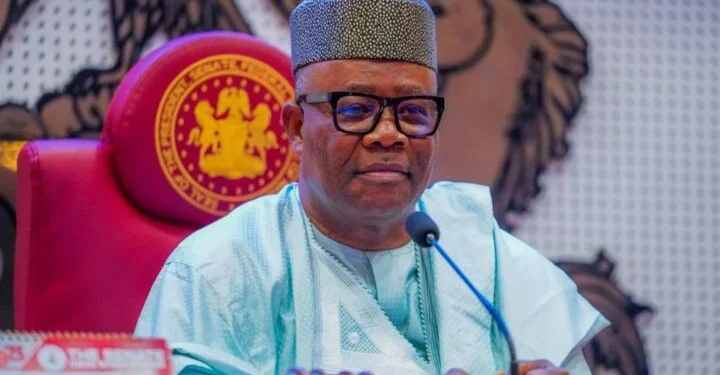Senate President, Godswill Akpabio, has said the National Assembly will prioritise the interest of all Nigerians in considering the Tax Reform Bills.
Akpabio made the pledge on Wednesday in Abuja at a roundtable on the four tax reform bills organised by the National Institute for Legislative and Democratic Studies (NILDS).
He said that the bill before the National Assembly represented a critical step forward in modernising Nigeria’s tax system.
He explained that the bills, when passed into law, would ensure a more equitable distribution of the tax burden among all Nigerians.
According to him, these bills aim to enhance efficiency, improve revenue generation, and ultimately, build a stronger, more prosperous Nigeria for all.
Akpabio acknowledged that the introduction of the bills had been met with some misunderstanding and politicisation by certain segments of the society.
The senator said that the misunderstandings should not be seen as a setback, but rather as a testament to the growing democratic maturity of the country.
“As your representatives, we want to assure our compatriots that the members of the National Assembly have heard your voices.
“We stand here, not as adversaries, but as partners in the quest to build the Nigeria of our dreams.
“We know that we have the unwavering trust of the Nigerian people, and we will never, ever, betray that sacred trust in the performance of our duties.
“Let us use this moment to reaffirm our unwavering commitment to a National Assembly that is pro-people, pro-democracy, and pro-progress.
“As the great Nelson Mandela once said, “It always seems impossible until it’s done.” My friends, together, we can make the impossible, possible with this tax reforms,” he said.
He commended the organisers for the initiative saying that NILDS had consistently demonstrated its commitment to fostering constructive dialogue and serving as a bridge between the legislature and the Nigerian people.
Earlier, the Director-General of NILDS, Prof. Abubakar Sulaiman, said that the importance of an efficient tax system to national development was a public knowledge.
He said that one of the challenges Nigeria faced as an emerging economy was the presence of several policy and institutional weaknesses that created loopholes in the tax system.
According to him, this singular challenge remains one of the pitfalls of effective public financial management in Nigeria.
The director-general said that there was an urgent need for tax reforms in the country saying that it was long overdue.
Sulaiman explained that contrary to the fears expressed by many, the tax reforms were designed to reduce the burden of taxation of all people by the government.
The DG said that it would also make the tax system more progressive and less regressive while simplifying the tax system by making it more accountable and understandable.
He said that the controversies surrounding the bills underscored the need for a fair and balanced tax system that mirrors the specificities of the Nigerian society.
“Therefore, as Nigerians continue to debate the merits and demerits of the tax reform bills, it is imperative to create the platform for engagements by all stakeholders towards passing a law that lays a strong fiscal and revenue foundation for sustainable growth and development in Nigeria.
“It is expected that the discussions today shall cover the main reforms contained in the tax reform bills, explore the extant legal and institutional challenges inherent in the current tax system and the interventions of the tax reform bills within prevalent social, political, and economic context.
“The core objective of today’s engagement therefore, is to explore perspectives on the potential short and long-term benefits and risks of reforms contained in the new tax reform bills.
“I hope that deliberations at this roundtable form the crucible for policy recommendations that will be taken into cognisance during the passage of the bill into law,” he said.
Also speaking, Mr Taiwo Oyedele, the Chairman, Presidential Fiscal Policy and Tax Reforms Committee, provided answers to the many misconceptions on the bills.
Oyedele said that the tax bills carried reforms that were important for the growth and development of the country which Nigeria could not afford to lose.
He said that one of the most debated section of the bills was on the VAT sharing formula which the existing formula was being challenged in court by two states of the federation.
Oyedele said that the bills sought to correct it as it would be chaotic if states were allowed to collect VAT because it would not augur well with businesses in the country.
The chairman said that the bill did not have any clause to merge existing agencies saying that the bills sought to enhance collaboration.
He also a said that contrary to opinion held by some group, the bills did not have any clause to task the poor.
The chairman said that the bill, when passed into law, would exempt low income earners from paying Personal Income Tax as well as small businesses.
He said that on the long run, all Nigerians would be better for it as they would be beneficiaries of the reforms. (NAN)











